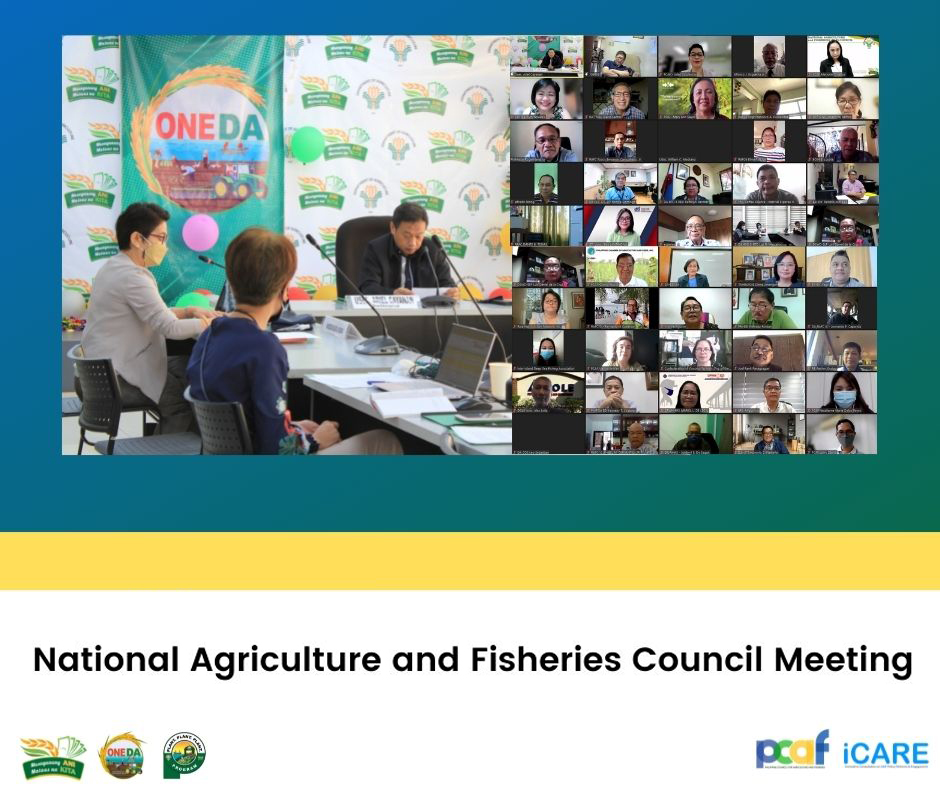
The National Agriculture and Fisheries Council (NAF Council) started the year by stepping up its planning and implementation efforts for the transformation of the Philippine Agriculture on January 5, 2022.
One of the urgent matters tackled was the rehabilitation and recovery plan for the regions affected by Typhoon Odette. In line with this, Department of Agriculture (DA) Chief-of-Staff Dr. Leocadio Sebastian elaborated on the available assistance for farmers and fisherfolk which included the:
- Survival and Recovery (SURE) Assistance Program of the Agricultural Credit Policy Council for 20,000 farmers and fisherfolk at PhP25,000 each;
- Provision of rice, corn and assorted vegetable seeds;
- Provision of drugs and biologics for livestock and poultry; and
- Indemnification of affected farmers by the Philippine Crop Insurance Corporation.
He also presented the pre- and post-disaster activities that DA identified to help the various stakeholders prepare for disasters and manage their aftermath. These involved the:
- Provision of guide for farmers to adjust planting calendars to avoid high-risk periods of typhoons, droughts and pests and diseases;
- Advisories to harvest matured produce;
- Provision of seeds for rice, corn and other high-value crops as well as drugs and biologics for livestock and poultry for rehabilitation;
- Deployment of Bureau of Fisheries and Aquatic Resources vessels to support disaster responses;
- Provision of materials for repair of fishing boats; and
- Enhanced availability of rice buffer stocks in affected areas.
Also discussed in the meeting was the plan of DA to operationalize the different commodity industry roadmaps to ensure the growth of the agriculture and fisheries industry this 2022.
Although the funding will be dependent on the budget allocated for banner programs in the approved 2022 General Appropriation Act, the implementation of the roadmaps will be pursued and a manual of operations will be developed for consistent implementation and monitoring. Updates will be reported to the National Banner Program Committee (NBPC) members.
In line with this, the NBPC Chairpersons reported on their respective commodities and presented urgent issues for clarifications and resolutions.
One of these concerns is the possible effect/s on recovery plans for Typhoon Odette on the procurement of agri-fishery equipment given the election ban. Undersecretary Ariel Cayanan, one of the Vice-Chairpersons of the Council, responded that DA is willing to assist the suppliers in expediting the release of imported A&F machinery from the Bureau of Customs.
NBPC on Fisheries and Aquaculture Chairperson Dinna Umengan requested support on the provision of gears and boats to fisherfolk affected by the recent typhoon. Assistance on clearing fishing nets washed away in the oceans were also requested to manage wastes.
Meanwhile, Regional Agricultural and Fishery Council Chairpersons also expressed their concerns on the insufficiency of storage facilities for procured and disseminated agri-fishery supplies such as food supply, seeds, machinery, etc,.
Usec. Cayanan suggested that farmers’ cooperatives and associations need to provide proposals for the establishment of storage warehouses, supported with production data in their respective areas. He also informed the members that a masterplan for food logistics chain was already being crafted, which includes the establishment of storage facilities and diversification of crop and production sources.
In addition to this concern, the Council discussed the concerns on the Administrative Order (AO) No. 36, Series of 2021 or the “Transfer of the National Training Center for Pig Husbandry from the Agricultural Training Institute to the Bureau of Animal Industry and Renaming the same as the National Swine Research and Training Center”. The Philippine Council for Agriculture and Fisheries (PCAF) will provide a venue to discuss the possible impacts of the AO and how it can be addressed.
On the other hand, the private sector partners requested a review for possible amendments of the Republic Act 11203 or Rice Tariffication Law (RTL) and the utilization of Rice Competitiveness Enhancement Fund (RCEF). Their particular concern is in the establishment of water impounding infrastructures to provide irrigation and ensure the equitable distribution of water across production areas, especially during the dry season.
DA assured them that it will continue to pursue initiatives to provide free irrigation for the farmers. In fact, a unit under DA was already organized to spearhead the review of RCEF. Private sector development partners of the DA will also be involved in the inclusive assessment and review process.
Furthermore, the private sector partners requested to include addressing the impacts of Foreign Trade Policies that include issues on importation and smuggling, to the domestic agri-fishery industry in the DA plans and strategies.
They urged the DA to strike a balance between policies on liberalization, importation and protectionism of international and domestic policies and to consider the welfare of local farmers and investors in the development of trade policies.
Usec. Cayanan emphasized that DA management always keeps the local farmers and fisherfolk at the center of its planning activities and initiatives and instructed the NBPCs to discuss their concerns at their respective committees first.
Lastly, the private-sector partners commented on the Fiscal Year (FY) 2021 budget utilization of DA agencies since this will greatly affect their approved budget in the coming years. The DA assured that the budget utilization will be further discussed in the Special Budget Committee meetings of NAF Council, where the agencies will be required to present their FY 2021 targets, accomplishments and level of utilization.
NAF Council is the apex consultative and advisory body of the DA, which is composed of key government agencies, local government units, private sector entities, non-government organizations, and people’s organizations that sets the goals and defines the scope of the country’s agriculture and fisheries policies, plans, and programs.
The Council also serves as the integrative, consultative, and monitoring structure for inter-agency and inter-sectoral collaboration activities as prescribed by Republic Act 8435 or known as the Agriculture and Fisheries Modernization Act.
PCAF acts as the technical secretariat to the NAF Council. | JCL











